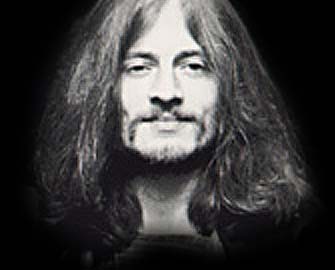 |
 |
Partly through musical boredom�the bass remained a misunderstood and thoroughly underrated instrument in those dark ages of British rock�and partly through a desire for artistic adventure, John Paul started to investigate keyboard instruments. He�s played church organ as a lad, so he already possessed the rudiments of keyboard expertise.
"Organ was originally my favourite love," he said, adding wryly, "but for session playing, I found it much easier to carry a bass guitar to work than a Hammond organ. So there I was living with all I had�a guitar, a Hammond organ, and a table and bed in my room in London.
"As a bass player, I wasn�t influenced by a lot of people because it was only in the mid- to late-1960s that you could even hear the bass properly on records. I had a number of obvious jazz influences�most of the good jazz bass player influenced me in one way or another...Charlie Mingus, Ray Brown, Scott LeFaro. I even got into jazz organ for a while until I couldn�t stand the musicians any more and I had to get back to rock and roll."
"I�ve got to own up. The first record that really turned me on to rock bass guitar was "You Can�t Sit Down" by Phil Upchurch which has an incredible bass solo and was a really good record as well. It was very simple musically but the record had an incredible amount of balls."
"The only real impetus I had for arranging was panic. I put me hand up. You know how it is�somebody asks does anybody do any arrangements and you say, �Yeah, sure.� Then as the session gets closer, you get a book and try and work out what goes where. After a couple of these situations, you find you�re an arranger. It happens that way for a lot of people."
John Paul arranged the outstanding single "She�s a Rainbow" for the Rolling Stones and also worked on several tracks on the Their Satanic Majesties Request album.
Source: Yorke, Ritchie. Led Zeppelin: The Definitive Biography. Novato, California: Underwood-Miller, 1993.
John Paul Jones media on this site:
sound clips
John Paul Jones web sites:
Presence
Baja
|
"My parents were both in the business. They were in variety�with a double act, a musical comedy thing. I�ve been on the road since I was two years old!"
"He [Jones� father] said I should play saxophone because I�d never starve," Jones laughed with the wisdom of hindsight. "But I didn�t want to play sax�I wanted to play bass. When he found out I could play the bass, he said, �All right, good bass players are hard to come by.� And off we went doing weddings and masonics and the usual run of things."
An only child, Jones had first taken up the bass as a fourteen-year-old student at Christ College boarding school.
Tony Meehan vividly recalls that particular audition. "It was held above the Roebuck Pub in Tottenham Court Road in London. We had a single called "Diamonds" at number one on the charts and we were putting together a band. John Paul heard about is and showed up. He was just out of school, very young and a bit nervous. Despite the nerves, he was a good musician and he knew his shit. He was cocky too in a certain way and I liked that. So we hired him. "He toured with us for a year or so until the band broke up."
Undoubtedly the Meehan-Harris line-up was ahead of its time. The widely acclaimed John McLaughlin was on lead guitar, while the late Glen Hughes, who achieved prominence with Georgie Fame�s Blue Flames, was blowing sax.
"We were doing the sort of things which Chicago and Blood, Sweat and Tears came up with a few years later," Meehan claimed. "But we were booed off stage with some of it, the mainstream jazz things. People didn�t want to listen, they just wanted to bop. It was dancing days�you didn�t listen to music."
Jet Harris: "He�s well read, a thinker, very intelligent. For John Paul, rock and roll was obviously neither the beginning nor the end of his musical potential. I think rock was really only a convenient vehicle for him; he would have been equally at home in either a jazz group or a classical orchestra."
|










